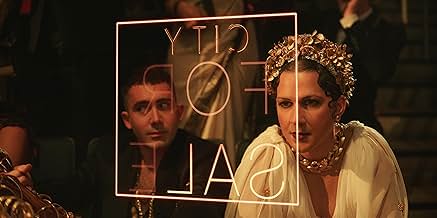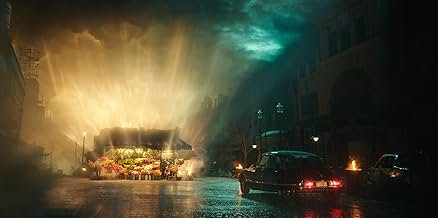The city of New Rome faces the duel between Cesar Catilina, a brilliant artist in favor of an Utopian future, and the greedy mayor Franklyn Cicero. Between them is Julia Cicero, with her loy... Read allThe city of New Rome faces the duel between Cesar Catilina, a brilliant artist in favor of an Utopian future, and the greedy mayor Franklyn Cicero. Between them is Julia Cicero, with her loyalty divided between her father and her beloved.The city of New Rome faces the duel between Cesar Catilina, a brilliant artist in favor of an Utopian future, and the greedy mayor Franklyn Cicero. Between them is Julia Cicero, with her loyalty divided between her father and her beloved.
- Awards
- 4 nominations
- Huey Wilkes
- (as Bailey Ives)
- Director
- Writer
- All cast & crew
- Production, box office & more at IMDbPro
Storyline
Did you know
- TriviaFrancis Ford Coppola wrote the script in the early 1980s, but the film was kept on the back-burner partially due to his financial debts. Pre-production finally began in 2001 after filming 30 hours of second unit footage and holding table read with Paul Newman, Uma Thurman, Robert De Niro, James Gandolfini, Nicolas Cage, Leonardo DiCaprio, Russell Crowe, Edie Falco, and Kevin Spacey, but the project was scrapped after the September 11 attacks, because a scene from the script (page 166) "predicted" the attacks. Coppola fully abandoned the project in 2007, and didn't begin developing it again until 2019.
- GoofsAt 21:40, Catilina's character says the phrase "Holy Jesus Christ!" in amazement. Yet, within universe, the city of New Rome stems from a culture based on Roman Mythology (example: 54:47, the dedication to Vesta; 01:55:51, someone says "The will of Cronus", or at 01:56:49, a statue of Saturn is displayed prominently, while there are many more depictions of Roman deities). In this universe, Christianity doesn't exist. There's no reason Catilina would use the phrase "Holy Jesus Christ!" and in such context.
- Quotes
Cesar Catilina: *You* wanna help me?
Julia Cicero: Yeah. And, well, I... well, I want to learn.
Cesar Catilina: And you think one year of... medical school entitles you to plow through the riches of my Emersonian mind?
Julia Cicero: Entitles me?
Cesar Catilina: Yes.
Julia Cicero: [scoffs] Entitles me?
Cesar Catilina: Yeees!
Julia Cicero: Entitles me?
Cesar Catilina: YEEEEEES!
Julia Cicero: You have no idea about me! You think I am nothing, just a socialite?
Cesar Catilina: No, not nothing, but I reserve my time for people who can think. About science. And literature, and... architecture and art. You find me cruel, selfish and unfeeling? I am. I work without caring what happens to either of us. So go back to the cluuuub, bare it all, and stalk the kind of people that you enjoy.
Julia Cicero: Fine! I will.
Cesar Catilina: Come back when you have more time!
- Alternate versionsThe "Ultimate IMAX Experience" version of the film features a live actor asking questions during the filmed press conference.
- ConnectionsFeatured in Amanda the Jedi Show: MEGALOPOLIS is my Nightmare | Explained (2024)
- SoundtracksMy Pledge
Written by Grace VanderWaal
Performed by Grace VanderWaal
Courtesy of Columbia Records
By arrangement with Sony Music Entertainment
Produced and Orchestrated by Kris Kukul
The film's plot revolves around the ideological clash between the prodigious architect Cesar Catalina, a Nobel laureate, and Frank Cicero, the mayor of New Rome-a futuristic New York City. While the politician governs with his eyes set on the past, relying on experience and tradition in his decisions, the architect dreams of radically transforming life through a utopia enabled by "megalon," a miraculous material. Throughout the film, Coppola denounces the rampant hypocrisy and corruption of contemporary Western society. The spectacle of life, the manipulation of information, the commercialization of sex-all these are symptoms of a morally bankrupt empire, led by a decadent elite lost in excess and vanity. The only way out for such a civilization appears to be the reform envisioned by Cesar. He believes he can resolve all social contradictions through his "megalon," raising a new world from the ruins of New Rome. To achieve this, he must overcome skeptics and survive the vicious.
Although *Megalopolis* was originally conceived over twenty years ago, the discussions Coppola raises are strikingly relevant, especially in his critique of mass media and mass politics. The film has a beating heart and can engage the viewer in its most intense moments. What it unfortunately lacks, however, is structure and substance. Coppola paints his film like a Pollock painting, yet without any sense of harmony or flow in his brushstrokes, and the result is a chaotic and disjointed work. *Megalopolis* is laden with intention and argument, but it lacks direction, lacks synthesis, and fails to turn its theme into poetry. The film blends grandiose imagery, bolstered by a thunderous score, with the ridiculous, as crude visual effects bring a cheap surrealism to life. The dialogues are eloquently robotic, and they only function because of the actors who manage (which is a testament to the quality of the cast) to convey some humanity to their characters. Coppola fails to present New Rome as a believable, palpable world, which limits the viewer's ability to become involved. At no point does the city appear as anything more than a metonymy for America, and its inhabitants are not particularly compelling.
The film is also packed with homages to classics that inspired the director, with one scene, for instance, evoking the epic *Ben-Hur*. Amid so many tributes, one stands out, perhaps to the detriment of the film itself. From its very title, *Megalopolis*, comparisons with Fritz Lang's legendary *Metropolis* become inevitable. Coppola's production, in some ways, is almost a modern reinterpretation of the German master's work, with some parallels between the two films. In both, the protagonist is a wealthy young man trying to address the terrible inequalities of a futuristic society. And in both, love is a positive force that drives change-the man who loves yearns to transform society. But while *Metropolis* is flawless in its presentation, *Megalopolis* fails to convince. It does not impress with its visuals, which are largely uninteresting; it does not deliver an engaging plot, nor memorable characters. It has the virtue of saying exactly what the filmmaker wanted to say-it is assertive and confident in its message without being, however, preachy. But a dozen well-thought-out metaphors do not make a good movie.
Coppola may have become a prisoner of his own myth. Many refuse to accept anything less than a masterpiece from him, and *Megalopolis*, unfortunately, is not one of his better moments. It is a film ambitious in concept but weak in execution. It engages with the issues of its time but fails to create pathos. It reaffirms faith in humanity and the transformation of the world, but it lacks a story and characters that could amplify its message. It is certainly not a triumphant return for the director, but it is not a detestable piece of work either. For viewers willing to intellectually engage with the film and forgive its flaws, *Megalopolis* can capture attention and reasonably convey its director's ideas. It can even entertain, as the actors are fully invested in the script's quirks, and there is something charming about Coppola's vision for the future of humanity.
- willianpdelima-46889
- Nov 10, 2024
- Permalink
The Year in Posters
The Year in Posters
- How long is Megalopolis?Powered by Alexa
Details
Box office
- Budget
- $120,000,000 (estimated)
- Gross US & Canada
- $7,629,085
- Opening weekend US & Canada
- $4,007,797
- Sep 29, 2024
- Gross worldwide
- $13,777,958
- Runtime2 hours 18 minutes
- Color
- Sound mix
- Aspect ratio
- 2.00 : 1
Contribute to this page











































